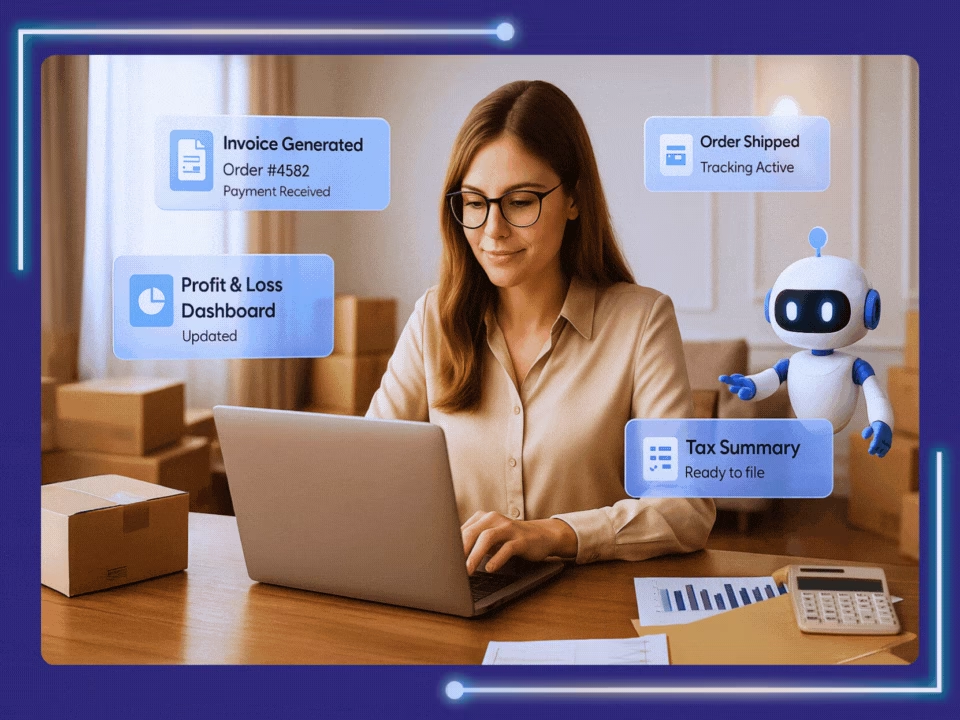Table of Content
Share This Article
- Published: Oct 31, 2025
- Last Updated: Oct 31, 2025
- 🔊 Listen
Quick Reads
- Ecommerce businesses face challenges like multi-platform transactions, tax compliance, and inventory control demanding precise management.
- Accounting automation software streamlines tasks such as reconciliation, reporting, and tax filing.
- QuickBooks, Xero, Zoho Books, and Sage are top choices offering automated accounting for ecommerce businesses.
- Automation ensures accurate insights, fewer errors, and steady cash flow for ecommerce growth.
- An ecommerce accountant can optimise these tools to boost efficiency and profitability.
Ecommerce businesses face a complex array of accounting challenges, from managing transactions across multiple platforms to handling tax regulations and inventory tracking. These tasks demand precision and efficiency to maintain profitability and support growth.
Automating key accounting processes can significantly reduce errors and free time to focus on expanding the business. This blog outlines crucial ecommerce accounting tasks to automate and highlights the most effective automation tools available in the UK market.

From Data to Dollars
Elevate Your Ecommerce with Smart Accounting & Analytics
Benefits of Accounting Automation for E-commerce Businesses in the UK
Automation gives e-commerce businesses a way to stay on top of high transaction volumes, GST obligations, and fluctuating inventory without drowning in manual work. Skilled e-commerce accountants are using automation tools to cut out repetitive tasks, sync sales data from multiple platforms, and deliver real-time financial insights that support smarter decisions.
Here’s how automation directly benefits e -commerce businesses:
- Saves time and reduces errors: Automating data entry, reconciliations, and report generation eliminates manual input mistakes and frees up hours each week.
- Improves cash flow visibility: Real-time syncing of sales, expenses, and payouts gives a clear view of available cash and upcoming obligations.
- Simplifies VAT and MTD compliance: Automatically calculates and reports VAT on sales and purchases, ensuring filings under Making Tax Digital are faster and stress-free.
- Enhances inventory control: Tracks stock levels and updates cost of goods sold (COGS) automatically across multiple sales channels.
- Strengthens financial reporting: Auto-generates dashboards, profit margins, and performance insights to support data-driven decisions.
- Supports scalability: Automation scales easily as transaction volumes grow, ensuring your accounting system can handle busy seasons without extra staff.
- Integrates platforms seamlessly: Connects e-commerce stores, payment gateways, and accounting software to maintain one source of truth for financial data.
Key E-Commerce Accounting Tasks You Can Automate
Online businesses generate hundreds of transactions every day, and keeping up manually isn’t realistic. Automation takes over repetitive work, syncing sales data, reconciling payments, tracking stock, and handling tax reports. This is what smart accounting for e-commerce looks like today: efficient, accurate, and largely hands-off. In this section, we’ll walk you through the key accounting tasks you can automate for your e-commerce business.
Transaction Entry
Automation syncs sales, refunds, and payments directly and in real time to reduce input errors, eliminates manual daily posting, and ensures consistently updated books across all channels
Reconciliation
Automated tools instantly match payments from gateways (PayPal, Stripe) with bank deposits and transaction records, allowing staff to focus solely on resolving exceptions instead of checking every entry.
Expense Management
Expense trackers automatically categorise all expenses (shipping, marketing, fees) by importing data directly from accounts or receipts to avoid manual entry, clarifies actual business costs, and uses digital receipt storage.
Inventory Tracking
Automated inventory management systems update stock and COGS in real time across multiple platforms as orders are processed to prevent overselling and help maintain optimal stock levels.
Invoice and Billing
Automation software instantly generates customer invoices and sends scheduled payment reminders upon order confirmation. This maintains steady cash flow, reduces overdue accounts, and keeps all invoices accessible online.
Tax Compliance
Automated tax tools accurately calculate applicable rates (VAT, overseas sales, facilitator laws) for each sale and prepare ready-to-submit filing reports. This ensures e-commerce businesses stay compliant without extensive, time-consuming manual review.
Financial reporting
Automation instantly generates real-time reports like profit and loss, balance sheets, and cash flow by pulling data from all sales channels, helping business owners track performance and make faster, smarter financial decisions.

Best Accounting Automation Tools to Streamline Ecommerce Finances
The right automation software can turn e-commerce accounting from a time drain into a smooth, data-driven process. Tools such as Xero, QuickBooks, SYNDER, Zoho Books, Sage, Tradebox, FreeAgent, A2X, Link My Books, and FreshBooks are trusted by e-commerce accountants to manage everything from sales data to tax reporting. Here’s how each one supports smarter, automated financial management.
1. Xero
- Automatically import online store sales/orders from platforms like Shopify, Amazon, eBay into Xero so you don’t manually enter each transaction.
- Sync inventory levels and multi-channel data (stores + marketplaces) with your accounting ledger, helping you avoid overselling.
- Automate revenue recognition, tax categorisation (including multi-currency if you sell internationally) and feeding that into financial reports and dashboards in real time.
- Use the app-store ecosystem to link specialised automation apps (for shipping, returns, listing, etc) to reduce manual bookkeeping tasks.
2. QuickBooks Online
- Automatically import sales channel data including orders, payouts, and fees from Shopify, Amazon, PayPal, and eBay into QuickBooks.
- Bank/credit-card feeds update automatically; set rules so transactions are categorised and matched without manual entry (helps with high-volume e-commerce).
- Automate recurring tasks such as summary reports, invoice and bill generation, and product or service codes linked to online store items.
3. SYNDER
- Reconcile data and match transactions in one click, including handling multicurrency, 0-duplicate entry, and fixing reconciliation issues.
- Automatically sync sales, fees, taxes and refunds from 30+ platforms (e.g., Shopify, Amazon, PayPal, Stripe) into your accounting system.
- Creates and syncs invoices automatically, closes them once payments are received, and sends automated reminders for overdue payments.
4. Zoho Books
- Enable two-way sync with the Zoho Commerce storefront so products, orders, payments, and customers automatically move between the store and the accounting system.
- Set up workflow rules in Zoho Books to automatically send emails, apply discounts, update fields, or trigger webhooks when a payment is received.
- Automate bank-feed imports, expense receipt capture, and categorisation so fewer manual entries useful when e-commerce generates many small transactions.
5. Sage Business Cloud Accounting
- Connect with payment gateways and e-commerce add-ons so that online orders/payments flow into Sage automatically.
- Built-in features for real-time dashboards and cashflow that update as transactions come in from your store/marketplaces, helpful for tracking performance during busy seasons.
- Automate stock and invoice flows by connecting store items to Sage, generating invoices automatically when orders are placed, and setting up alerts for reorder levels.
6. Tradebox
- Automatically create customers, invoices (or sales orders) and bank receipts in the accounting software based on sales channel data.
- Integrates multiple e-commerce/multi-channel sales and automatically imports orders into your accounting system.
- Calculates VAT per item/transaction depending on buyer destination, handles overseas/exports VAT rules, and generates MTD-compliant entries.
7. Freeagent
- Automatically builds real-time business accounts from bank statements, invoices and expenses you enter throughout the year.
- Automate recurring invoices and send automated payment reminders to debtors, reducing chasing time.
- Automatically categorises expenses and bank transactions (via feeds), so you spend less manual effort on classification.
8. A2X
- Designed for multi-channel e-commerce (Amazon, Shopify, eBay) to summarise sales/fees and push accurate entries into accounting software automates payout-reconciliation and fees split for improved accuracy.
- Automates the matching of marketplace settlements with accounting records, so you don’t manually reconcile numerous small transactions and fee lines.
- Especially valuable for businesses selling via multiple channels helps ensure accurate cost-of-goods, returns and multi-currency effects without manual bookkeeping.
9. Link My Books
- Automatically connects e-commerce platforms to accounting systems so orders, refunds, fees, and inventory flow into the ledger without the need for manual exports or imports.
- Helps consolidate multi-channel data, so the books reflect all your online sales channels with fewer manual interventions.
- Helps implement standardised coding/mapping of transactions across stores/marketplaces, a major time-saver for e-commerce owners facing seasonal peaks.
10. FreshBooks
- Automatically sends recurring invoices, applies late fees, and triggers payment reminders to keep cash flow consistent
- Uses OCR to capture and categorise expenses from uploaded or mobile-scanned receipts, helping e-commerce sellers stay audit-ready.
- Syncs directly with bank accounts to import transactions and auto-match them against invoices or expenses.
Take Your E-Commerce Accounting to the Next Level with Automation Experts
Whether you sell through Shopify, Amazon, or multiple online channels, manual bookkeeping slows growth and clouds financial visibility. Automation brings every part of your business together, syncing sales, payments, inventory, and reports to create a clear, real-time picture of your finances.
At Whiz Consulting, we specialise in ecommerce accounting, combining expert insight with advanced tools like Xero, QuickBooks, NetSuite, Zoho Books, and Dynamics 365. From transaction recording to financial reporting, we help you build an automated system that keeps your numbers accurate, your compliance effortless, and your decisions data-driven.
Take the next step and reshape your ecommerce accounting into a smarter, always-on financial engine that grows with your business!

Get customized plan that supports your growth
Have questions in mind? Find answers here...
Yes, many accounting software solutions automate VAT calculations and filings, accurately handling VAT rates and digital submissions to HMRC, reducing manual errors and time.
Automated accounting saves time, reduces errors, improves cash flow visibility, simplifies tax compliance, and keeps financial data updated in real time for smarter ecommerce decisions.
Integration can be done via built-in connectors or APIs. DIY setups suit smaller stores. Larger businesses may prefer expert help for smoother ecommerce accounting automation.
Costs vary with business size, invoicing volume, and services chosen. Small firms pay less; larger ecommerce companies with complex needs face higher fees for setup and support.
A skilled ecommerce accountant can enhance your software’s value by providing expert insights, optimising workflows, and handling complex tax issues beyond basic automation capabilities.
Thousands of business owners trust Whiz to manage their account
Let us take care of your books and make this financial year a good one.
This website uses cookies to improve your experience. You can accept all or reject non-essential cookies.









